by Mark Harvey
Opinion has caused more trouble on this little earth than plagues or earthquakes. —Voltaire (1694 – 1778)
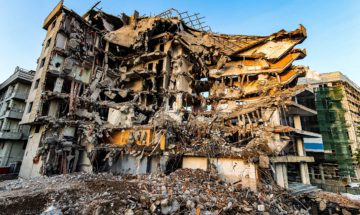
About the only good thing that comes out of huge natural disasters is that it brings otherwise feuding and even warring countries together in humanitarian rescue efforts. Immediately after the recent earthquake in Turkey and Syria, rescue teams from all over the world amassed huge amounts of food, medicine, clothing, and rescue equipment, boarded airplanes and trucks and swarmed into the two heavily damaged countries to do some genuine, unadulterated good.
An 80-member world-class search and rescue team plus four search dogs with world-class noses from the UK hit the ground in Gaziantep, Turkey, barely two days after the quake. The team arrived with specialized seismic listening devices, concrete cutting equipment, and shoring materials. The crew is self-sufficient and brought its own food, water, shelter, communication, and sanitation gear.
An 80-member rescue team from China, also with four dogs, arrived in Turkey the same day as the UK team. The Chinese came with 20 tons of medical and communications equipment.
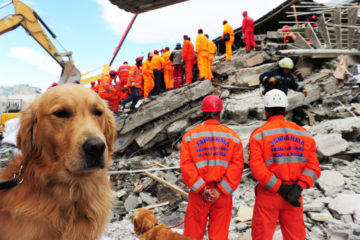
My favorite disaster relief organization, the French-based Doctors Without Borders, immediately went to work distributing blankets, medicine, and medical support teams in Aleppo and Idlib, Syria. They deployed surgeons and technical support for dozens of hospitals.
The earthquake that killed tens of thousands of people in Turkey and Syria originated near the junction of two tectonic plates, one moving north and the other moving southwest. Syria sits entirely on the Arabian plate and Turkey sits almost entirely on the Anatolian plate. The Arabian plate is making slow but steady progress northward. When I say slow, that means about three-quarters of an inch per year on average.
The Anatolian plate includes almost all of Turkey and like the geopolitics of Turkey seems to be crunched and torn between what is Arabian to its south and the Eurasian plate to its north. It’s also ripping along at about three-quarters of an inch per year.
The violent earthquake that shook the region early morning of February 6th was measured at 7.8 on the Moment Magnitude scale with aftershocks as high as 7.5. The triple combination of the powerful earthquake, poorly constructed buildings, and foundations set in unconsolidated soil led to the collapse of close to 3,000 buildings. Thousands of people in Turkey and Syria were buried in the rubble.
The many videos showing skilled rescue teams unearthing buried children who somehow survived days under the rubble will move all but the most hard-hearted. When dusty workers removed one more chunk of concrete to reveal the dazed face of a 7-year-old girl sheltering her little brother and stroking his hair to reassure him, the little girl says to the rescuer, “Please get me out of here, I’ll do anything for you. I’ll be your servant.” There are many videos like this of rescuers freeing a still living child under the rubble and breaking out in loud cheers. When you watch these videos, it’s easy to forget what a truly mixed-up species we are.
Because meanwhile not too far from Turkey, less than 1,000 miles to the north, our same species is doing their utmost to kill each other in Ukraine with far more men and women and even higher tech gear than that being used to save buried victims of the earthquake. Don’t get me wrong: I don’t equate Ukrainians using deadly force to defend their country with the deadly force used by the marauding Russians. One side is doing what any self-respecting, patriotic people defending their home should do, and the other side is blindly following the psychotic orders of an old man making one last grasp at relevancy.
Still, if aliens like those depicted in Isaac Asimov’s The Gods Themselves were to land in, say, Gaziantep, one of the hardest-hit cities in Turkey, and witness the heroic efforts of relief workers from all over the world, he might turn to his counterpart and say,
These earthlings really are more sane and compassionate than our type, even with our advanced photosynthesis digestion systems. Look at how they work tirelessly to save every soul. And look at the worry on the faces of their four-legged beasts as they sniff the rubble for human life. We need to bring this story to every soul in our parallel universe.
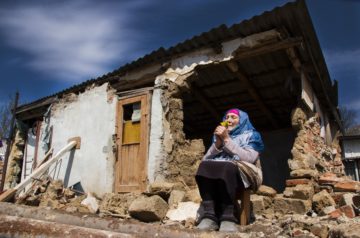
Had the same fictional aliens landed in the town of Bakhmut in eastern Ukraine in the same week, their take on earthlings would be altogether different. Watching hundreds of thousands of men and women spend day after day in hard winter conditions, all trying to kill each other without mercy, they might have looked at each other wordlessly, realizing that the gas was definitely greener back home across the time-space continuum.
Unfortunately, we as humans don’t seem to have the same cosmic perspective of how we operate on our tiny little planet here in this tiny solar system.
Though I enjoy reading history, I don’t find much glory in most wars: never have and never will. In my lifetime, almost all of the wars I’ve witnessed (from a great distance) have been—in my opinion—wantonly stupid and wanton wastes of lives. Thomas Merton, the Cistercian monk, called war cowardly and said, “The root of war is fear,” which is a paradoxical comment, but if you think about it, accurate. Putin’s great fear and motive for invading Ukraine was probably that he would never be anything like Peter the Great, but always Pallid Putin the Petit. Message to Putin and borrowing from Mark Twain: better to appear an inept leader than to needlessly invade a country and remove all doubt.
The war in Ukraine is one of the few wars that I can easily take a side on because the motives of each party are so counter-opposed. So in a way, it’s not the best example of how our species behaves badly because at least the Ukraine people are fighting heroically for a good cause: their homes and lives. I chose it for this piece because it is so close, geographically, to what’s going on in Turkey at the same exact time our species is working so diligently to save every possible life. But you could pick so many other examples of humans trying en masse to save lives next to the humans butchering each other on the same continent if not in the same country.
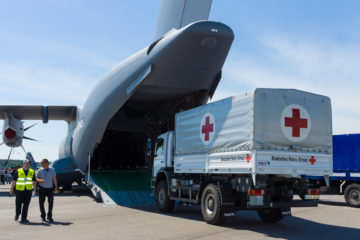
Take Yemen, for example. Even as a person who consumes far too much foreign news, I’ve literally googled “Yemen war explained” a number of times. My understanding of it is still vague. More than anything it seems like a proxy war between Saudi Arabia and Iran, and probably a residual proxy war between what used to be the Soviet Union and the United States. In one of the poorest countries on earth—a country where seventy-five percent of the population lives in poverty—some old men who have probably never seen combat thought it a good idea to unleash billions of dollars of high-tech bombs, missiles, and ammo. Of course it’s led to a terrible humanitarian crisis of mass starvation and disease.
And again, you see the countervailing heroism and the genuinely humane work of rescue agencies from across the world working in Yemen. UNICEF is endeavoring to raise close to half a billion dollars with the aim of giving 2.5 million women and children access to health care, half a million children treatment for severe starvation, and 3.6 million people water and sanitation infrastructure.
Doctors Without Borders is trying to work in the war-torn country and to date has provided 60,000 outpatient consultations for children under five years old, 104,000 hospital admissions, and inpatient feeding for 7,000 starving children.
Our aliens, from Asimov’s science fiction, visiting Yemen and watching the warmongers kill and maim next to the doctors, nurses, and aid workers trying to keep these poor beleaguered people alive would shake their strange heads and say, “What a strange species.”
One of the most touching stories I’ve read about the war in Ukraine—a story that captures both the power of love and the tragedy of war—was written by Jeffrey Gettleman in the New York Times. In the story, Gettleman describes the ultimately tragic plight of a young married couple (still in their twenties) who died in the same trench on the front lines on the eastern side of Ukraine. Neither of the couple were soldiers but volunteered for the army out of patriotism. At first, the couple was deployed to the town of Kropyvnytskyi, far from the fighting. But then Taras, the husband, was called to fight in Donbas on the eastern front. In Gettleman’s story, Olha, Tara’s wife, insists on joining his unit and going with him despite strong objections from her mother, mother-in-law, and Tara himself. At the Donbas front Olha was stationed at company headquarters, about a mile and a half from the trench warfare where her husband was fighting. But she kept sneaking up to the trench with a sleeping bag and rifle to be with her husband.
The two died together in the same trench under Russian attack. You’ll have to read Gettleman’s story to get the full force of the love between the couple and the shattering grief left to their parents by their deaths. Tara was an only child, and Gettleman quotes his father Yurri sitting by his son’s grave saying, “I should have tried harder to stop this war. We all should have.”
We’ve all seen the great lengths nations go toward developing high-tech equipment designed to kill and maim. Whether it’s laser-guided missiles, reaper drones, or self-steering bullets (under design), we’re good at the lethal stuff. It’s good to know that some of the best engineers have also developed some great life-saving technology. NASA has developed technology that can detect a person’s heartbeat under 30 feet of rubble using microwave radar sensors. Drones are being used for 3D mapping after earthquakes to help rescuers identify dangerous zones and safe zones. An Israeli Company called Sight Diagnostics has invented a very mobile machine that can detect internal bleeding, infection and damage to vital organs with just a sample of two drops of blood. The test only takes 10 minutes and is based on artificial intelligence. The machines are being used in Turkey to quickly evaluate the injured.
When I was young, I used to think lots of problems would be solved in my lifetime: poverty, famines, homelessness, etc. I was what you might charitably call a clueless idealist. I still have some of those qualities and throw myself at a lot of problems that won’t be solved in my lifetime. But man’s willingness to enter and fight bloody wars at the behest of aging idiots like Putin is beyond anything I’ll ever understand. If bloody wars ever become an atavistic thing of the past, I suspect it will be because mothers worldwide will bring enough shame onto those who start pointless wars. To raise a child for eighteen years and then lose him or her to an errant bullet in the flower of their youth while fighting over some muddy patch of eastern Ukraine has to make even the most devout question it all.
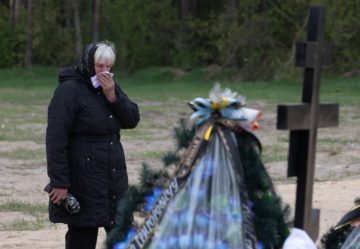
A Ukrainian parent who loses a child to the war there at least has the comfort of knowing that their child was really defending their country from killers. But if you’re a Russian mother, to be handed a machine-stamped medal and empty words about how your son or daughter’s efforts for the glory of the nation will never be forgotten has to aggravate the grieving. While the parents and friends will not forget, time quickly relegates pointless wars to where they belong: the dustbin of history.
